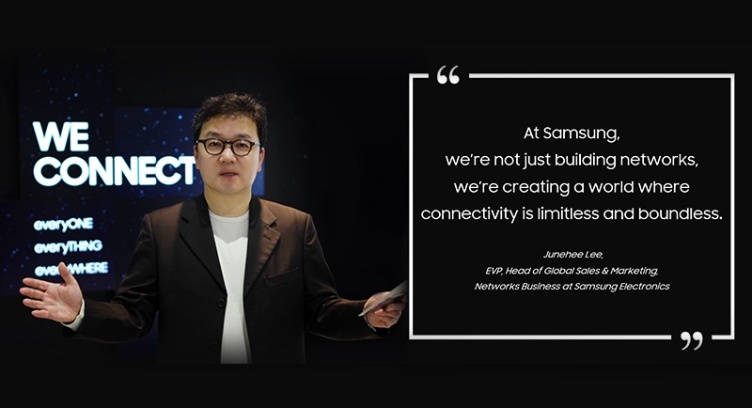At this year's Mobile World Congress (MWC) 2024, Samsung showcased how they are accelerating the transition to virtualized RAN (vRAN) and Open RAN – giving operators the confidence to transform their networks. Samsung unveiled its latest innovations and strategic vision across three key areas: end-to-end virtualization, a proven ecosystem, and sustainable and AI-based network automation solutions.
vRAN and Open RAN are gaining momentum as more leading operators turn to software-centric and open networks. As one of the first vendors to embrace vRAN and Open RAN, Samsung has deployed more than 38,000 O-RAN compliant vRAN commercial sites globally with Tier 1 operators. Furthermore, these aren’t just deployments, these sites are live and carrying commercial traffic around the world. Forward-looking operators have been adopting Samsung's innovative solutions, and Samsung is proud to achieve this remarkable breakthrough in collaboration with industry partners from its ecosystem.
Most notable announcements heading into the big show in Barcelona were Samsung's new business wins in Canada and Romania. Samsung will bring innovative vRAN and Open RAN technologies to each operator’s commercial network – advancing networks in both markets, further reinforcing Samsung’s vRAN and Open RAN leadership – helping operators to provide best-in-class connectivity to their customers.
Based on Samsung’s commercial track record and technological expertise, the company is now offering end-to-end virtualized network spanning RAN, Core, transport elements and the public cloud. This approach gives operators more flexibility, agility, sustainability and faster time-to-market with new services. At MWC 2024, Samsung announced collaboration with its partners on virtualized end-to-end network on public cloud and virtualized cell site router (vCSR), and showcased rApps for networks optimization and analysis, laying out its vision for next-generation networks.
The key to accelerating vRAN and Open RAN adoption is through pre-integration that validates the interoperability of multiple solutions. To achieve this, it is essential to build a robust and collaborative ecosystem and Samsung has been working closely with more than 20 vRAN and Open RAN vendors to ensure all network components interwork, bringing pre-validated solutions to commercial networks from Day 1. At the event, Samsung's close collaboration with diverse CPU partners attracted attention from the industry:
Samsung's vRAN leadership:
- Intel: Samsung and Intel have been collaborating on vRAN innovation since 2017, and the companies have already completed large-scale commercialization of vRAN (3rd Gen Intel Xeon Scalable processors) in the U.S., U.K., and Japan. The companies also accomplished the industry's first data call using the 4th Gen Intel Xeon Scalable processor with Intel vRAN Boost in the U.S. in a Tier 1 operator's commercial network. Most recently, the companies completed the first end-to-end call in the lab using Intel's Granite Rapids-D CPU for the first time in the industry.
- AMD: Just a week before the show, Samsung, Vodafone and AMD announced the completion of the first end-to-end call with Samsung's vRAN and AMD's Siena CPU. The companies demonstrated a test result exceeding 1 Gbps throughput for multi-UE on a multi-cell configuration.
- AWS: At the show, Samsung announced the completion of the first end-to-end call with Samsung's vRAN and Amazon Elastic Compute Cloud (Amazon EC2) instances powered by AWS Graviton processors.
In addition to the CPU updates, Samsung’s new rApps ecosystem was unveiled at the show. Aimed to help operators manage their complex networks and introduce innovation faster. Samsung’s open and interoperable application suite enables operators to optimize network management efficiency by embedding specialized functions specific to their networks.
Samsung’s RIC platform supports Open API, making it possible to integrate with Samsung applications as well as other market-leading ones. It helps operators to use various service scenarios and use cases, including comprehensive network analysis solutions for troubleshooting and optimization.
Sustainability is at the heart of Samsung’s product development strategy and infused in the company’s next-generation chipsets and products. Samsung has been improving its products' energy efficiency to pursue sustainability in network operations.
Samsung Networks Chipset is one of the strongest assets and the foundation for Samsung's technological capabilities, including vRAN and Open RAN. The company’s chipset portfolio ranges from modem SoC (System-on-Chip) and beamforming to RF Integrated Circuit (RFIC) and Digital Front End (DFE) chipsets. At MWC 2024, Samsung showcased how its latest network chipsets reduce power consumption and a smaller site footprint of hardware products.
At MWC 2024, Samsung showcased how its latest network chipsets reduce power consumption and a smaller site footprint of hardware products.
These new offerings will increase energy efficiency with comprehensive hardware innovation (including chipsets) and advanced software capabilities, allowing Samsung to reduce energy consumption per site by 25%, and 45% by 2027.
Backed by their long-term R&D vision, Samsung is always at the forefront of innovation. The company started its R&D early in collaboration with Samsung Research for 5G Advanced and 6G. At MWC 2024, Samsung revealed future-ready solutions such as 5G Advanced – Upper 6 GHz 128T128R MMU, and beyond – 13 GHz 256T256R, to help operators when they’re ready to advance their networks.
Samsung is actively working on developing AI features, leveraging its extensive experience across various industries such as telecommunication networks, semiconductors, and consumer-oriented business portfolios, including mobile phones and home appliances. As an industry leader, Samsung is constantly innovating future technologies, including AI, based on its deep understanding of consumers and insights from diverse business portfolios.
For telecom operators, Samsung offers AI-based network solutions ranging from automation and management. Samsung's AI-based network automation solution, Samsung CognitiV Network Operations Suite, enables multi-party end-to-end network automation – from network deployment and operation to optimization. With the Samsung CognitiV Network Operations Suite, operators can quickly deploy thousands of network sites simultaneously and efficiently optimize and analyze networks. In addition, leveraging Samsung's comprehensive energy saving management solution, operators can monitor network energy consumption and effects of diverse energy saving features for more sustainable networks.
By spearheading the vRAN and Open RAN movement and investing in sustainable technologies, Samsung helps build an open and vibrant ecosystem where operators have more optionality and flexibility to deploy networks suited to their unique needs. Samsung remains committed to developing best-in-class solutions, conducting groundbreaking R&D, and fostering partnerships that collectively move the entire mobile industry forward.




















